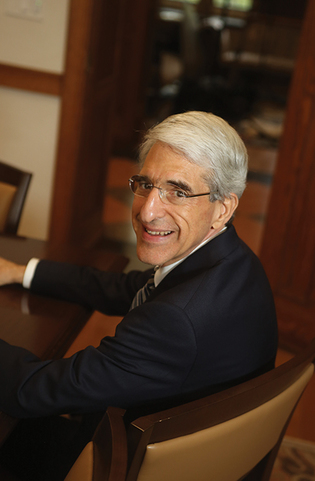
Mark Ostow
The Yale Alumni Magazine publishes a letter from President Peter Salovey ’86PhD in every issue. In this letter, the president discusses the cross-disciplinary innovation taking place around Yale.
View full image
Innovation drives so much of what we do across Yale—in the humanities, arts, social sciences, sciences, engineering, and methods of teaching and research.
When I think of innovation, I think of my father, Ronald Salovey, who grew up in the Bronx as the son of poor immigrants. After graduating from the Bronx High School of Science, the City College of New York, and Brooklyn College, he went on to earn his doctorate in physical chemistry from Harvard. He became a polymer chemist and worked at Bell Laboratories and Hooker Research Company before being recruited to the faculty of the University of Southern California to develop a polymer science program. At each of these places, innovation was a major focus of his work, and collaboration was what drove it.
My father’s research was not translational by design; he conducted basic research on how, for example, radiation exposure changes the physical properties of polymers. But he did this work in an environment where he crossed paths with peers with different backgrounds and areas of focus. One, a bioengineer and expert on orthopedic surgery named Harry McKellop, became a research partner, and the two used my father’s polymer science research to patent a safer material for more durable artificial hips. Basic research does not always lead to practical applications, but this collaboration ultimately changed lives and will always stay with me as a powerful example of what can happen when cross-disciplinary work is encouraged.
One of the most exciting hubs for cross-disciplinary innovation at Yale is Yale Ventures—launched last April. Yale Ventures combines several existing university groups that promote innovation and entrepreneurship under one umbrella, with significant new investment. Its mission is to increase Yale’s capacity to address major global challenges, and it is led by Josh Geballe ’97, ’02MBA, senior associate provost for entrepreneurship and innovation and a former member of the leadership team of Connecticut governor Ned Lamont ’80MBA.
Yale Ventures supports innovation on and off campus. As I write this, the pharmaceutical company Pfizer is in the process of acquiring Biohaven Pharmaceuticals, founded in 2013 based on neurological research conducted by Vlad Coric, associate clinical professor of psychiatry at Yale School of Medicine. The acquisition caps a high-profile success story in the Yale biotech world. It also means continued investment in New Haven, because Pfizer is spinning Biohaven back out into a local, publicly traded company that will continue to develop a New Haven–based clinical pipeline. This follows on the heels of AstraZeneca’s 2021 acquisition of Alexion Pharmaceuticals—founded by Leonard Bell ’84MD, formerly on the faculty of Yale School of Medicine. Alexion, too, will continue to grow in New Haven, becoming AstraZeneca’s global hub for rare-disease research. Yale also helped launch ten new biotech startup companies in the past year, including Modifi Biosciences, which focuses on DNA modification to treat cancers. It is based on research conducted by Ranjit Bindra ’98, ’07MD, ’05PhD, the Harvey and Kate Cushing Professor of Therapeutic Radiology; and by Seth Herzon, the Milton Harris ’29PhD Professor of Chemistry.
Still, we can have an even greater influence—not just in life sciences, but across technology, climate solutions, quantum computing, and more. To reach this potential, Yale Ventures is growing the ways it supports faculty members. For example, a generous gift earlier this year from Yale alumnus Will Roberts ’90 launched a new accelerator, the Roberts Innovation Fund, which provides grant funding, mentoring, and business training to support breakthrough inventions by engineering faculty members. Earlier, a generous gift by Len Blavatnik created a similar accelerator for the life sciences, the Blavatnik Fund for Innovation at Yale. Of course, students are also a vital part of innovation, and both the Roberts and Blavatnik funds include programs for them. Meanwhile, the Tsai Center for Innovative Thinking at Yale (Tsai CITY), established in 2017, continues to expand its mentorship, funding, and educational programming for students.
It is heartening to see the promise of new ideas, insights, and creativity spread across Yale and our home city. I also am reminded of the sense of wonder I had as a child when I visited my father’s laboratory. As I look ahead, I see the Yale community making even greater strides to foster innovation and nurture discoveries, and I hope you will have an opportunity to visit New Haven and see for yourself all that is happening on campus.
With my warmest wishes,
Peter Salovey ’86PhD
President
Chris Argyris Professor of Psychology
 loading
loading